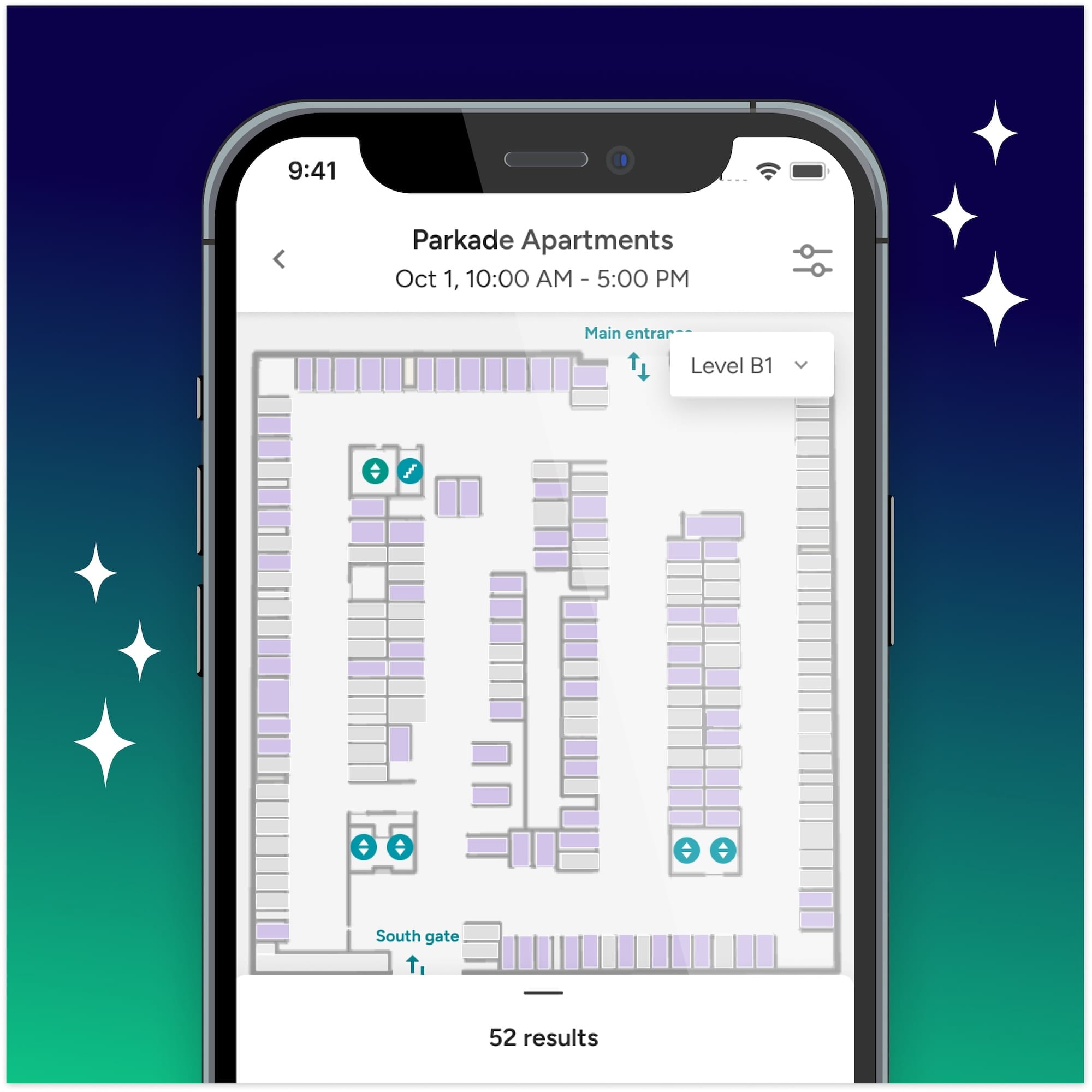

TABLE OF CONTENTS
Visitor parking — or “guest parking” — can be a massive headache for property managers, residents and their guests, if not handled correctly. We’ve spoken to dozens of properties around the country, and put together the most common pitfalls and top recommendations on how to do visitor parking right.
Read on to learn:
For your residents, the ability to easily have guests (friends, partners, family, etc.) visit and make sure they have a reliable and safe place to park their cars is a huge perk. For many, it’s more than a perk — it’s non-negotiable. In fact, lack of parking lot space consistently ranks as one of the top complaints from apartment residents.
And we get it. Everyone wants a great social life, and easy parking for visitors can play a big part in that. Without easy guest parking, some prospective residents simply won’t live at your property, and those that do will keep visitor parking top of mind throughout their time living at the property.
For instance, we spoke with a resident who chose not to renew his apartment lease because of parking. Brad Mallow, a 35-year-old California resident, told us: “I left my last apartment complex in LA, which had no visitor parking, mainly because I was tired of my friends and family having to park blocks away to come visit me!”
For property managers, this makes visitor parking programs a great way to provide a better resident experience and even draw in more prospective residents — while increasing revenue.
Sounds like a win-win, right? Well, not always.
As any property manager will tell you, getting visitor parking right is easier said than done.
The reality is that visitor parking is complicated. There are, quite literally, a lot of moving pieces. It’s often fraught with challenges for both residents and property managers.
Here are a few of the problems we see most:
The no. 1 problem communities around the country run into when it comes to parking is capacity. Communities, increasingly, have less parking on-site — both for residents and their visitors — especially as real estate developers are building less parking per unit over the last few decades.

That makes it tough to meet the demand for visitor parking, which, especially at peak periods, can be massive. A typical newly built 200-unit property might have had 400 parking spots in 1990. These days, 300 spots for 200 units is more typical for new construction — but that same property still has hundreds of resident vehicles and dozens of visitor vehicles to accommodate at once.
Carving out spots for visitors is vital, yet often, if residents have insufficient parking for their own vehicles, visitor parking is regularly overrun by residents’ own cars. And even if that problem can be solved, most properties will run out of visitor parking at the times it’s needed most, disappointing residents and their guests.
This need to maximize usage often results in communities doing “first-come, first-served” visitor parking to ensure no spots sit empty. But that in turn makes visitor parking completely unreliable, and is understandably frustrating to residents that just want to be able to reliably book parking for themselves or a guest ahead of time — for example, ensuring their elderly mother-in-law (a real VIP guest) will be able to find a spot when she comes to visit.
Just ask Chelsea, who left a review about how the lack of visitor parking options at her apartment building in Arlington, VA makes it “...almost impossible to have visitors during the week.”

With visitor parking demand shifting by the day, even by the hour, providing enough visitor parking can be a major challenge. And management should acknowledge that whether it’s allowed or not, visitors will try to park at the property.
If you don’t give visitors a legal way to park, they’ll end up violating parking policies and parking in residents’ spots — which both angers your residents and is likely to get the visitor’s car towed, angering the resident they visited, even if they were in the wrong.
Having property managers manage visitor parking is incredibly time-consuming. And let’s face it, it’s not a good way to do things.
Property managers have a ton on their plates as is. Add in updating parking logs, keeping track of guest parking receipts, handing out guest passes, enforcing parking and securely offering gate access — it’s easy to see how it can quickly become unsustainable.
At Canal Square, an upscale 300+ unit property in downtown Indianapolis, we spoke with property manager Sarah, who tried to offer secure visitor parking by having residents come to the office to pay for a pass and get a temporary gate code.
Soon, she was getting 10, 20, sometimes 30 knocks on her door per day, and having to manually update gate codes weekly to maintain security. “It was overwhelming!” Sarah told us.
“But parking around here is tough, and we’d lose residents without visitor parking, so I didn’t see much choice in the matter except devoting hours of staff time to guest parking.”
At La Galleria, a 187-unit high-rise community in San Francisco, George Leonard was tasked with the building’s finances. According to Leonard, they manually logged, tracked, and billed for guest parking. “The process was tedious and required lengthy follow-up by property management,” he said.
Sound familiar? It’s a story we hear from property managers constantly. Managing visitor parking this way is tedious work, yet often feels like the only viable option to keep visitor parking programs up and running.
The reality is that visitor parking frequently requires staff time that many staff simply don’t have to spare.
And this time spent directly translates into dollars. In a cohort study we recently conducted, we found that the staff time eaten up could steal between $60,000-100,000 from your revenue each year.
The majority of multifamily communities in the United States don’t offer visitor parking, and at those that do, the majority of them don’t charge for it — mainly because they don’t deem it worth property management time to sell parking for $1-3/hr.
With huge demand for visitor parking at every community, that could be easy money for a property. Money that could be spent on maintenance, better staff salaries or new amenities.
Resident parking is often challenging enough to manage and as a result, many apartments are simply unable to offer viable visitor parking permit options, leaving guests to find street parking nearby or risk parking illegally.
“There was just no world where we were doing short-term parking by the hour because there was just no way to manage that,” shared Erica MacDonald, Director of Community Management at Thrive Companies in Columbus, OH.
Buildings without visitor parking aren’t only missing out on the opportunity to provide a better experience to residents and their guests. They’re also missing out on the opportunity to generate additional revenue. Most of Parkade’s partner buildings make considerable sums on short-term parking, like:
Without a proper visitor parking, you’re leaving money on the table. But you don’t have to.
Think it’s impossible to offer visitor parking in a way that meets resident needs, captures significant revenue and doesn’t add to management’s workload? It’s possible! Just follow these top-8 recommendations we’ve gathered from property managers across the country:

So now you’ve read the recipe for success on how to create amazing visitor parking, but wondering how to do it? Parkade can be a huge help here.
Parkade is a centralized, app-based parking system that enables easy, reliable parking for everyone in your building in real time, even visitors.
With Parkade, there’s no need for you to dedicate specific spots to visitor parking (remember, it’s an invitation for abuse anyway!). Management doesn’t need to differentiate between resident and visitor spots, and parkers can fluidly (and quickly) change to meet demand between residents and guests.
No longer does management need to be the gatekeeper.
Instead of going through management, residents can use Parkade’s parking management app to:
“It’s very convenient for us and for the residents, especially when they have people coming over and can finally get them places to park instead of having to worry about parking on the street,” explained Kristina Ferguson, property manager at Centerfield Flats in Columbus, OH. “Everything is great having Parkade!”
Better still, Parkade also provides 24/7 parking enforcement services, and leverages “community reports” to spot violators, so enforcing visitor parking doesn’t mean more work for staff. We’ve got it from here!
And what about gate access? We have you covered.
Parking-gate access can be integrated with the app, by simply installing a wifi/cellular-enabled “dongle” into any existing parking gate. This means allowing trusted visitors to open the gate and meet their host at the elevator or their unit, without the hassle of registering with the office or keeping track of a physical gate code.
Making your guest parking amazing doesn’t just mean reducing staff workload and happier residents, it also brings in significant amounts of revenue. From Indianapolis to Los Angeles, Parkade has helped many communities earn upwards of $500/mo per spot in guest parking revenue.
But don’t just take our word for it.
“I love having Parkade, it’s made all the difference when accommodating guests. In addition, Parkade is very responsive to any issues and or problems,” shares Joseph Famulari, a La Galleria resident.
Remember, getting visitor parking right is easier said than done. But if you follow the steps outlined in this article, we hope it will make things run more smoothly in your building.
If you’re curious about parking management software, reach out for a free demo today.
.jpg)
As parking management becomes increasingly digital, security becomes critical — and we’re excited to share that we've achieved a major security milestone.
Read Story
We’re thrilled to announce one of our most significant leaps forward this year: the launch of dynamic maps across our mobile and web applications.
Read Story
Now that AB 1317 is official, it’s time to brush up on the requirements and see how your properties stand to benefit.
Read Story